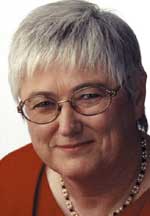
The Workers Party of New Zealand was a socialist political party in New Zealand. It published a monthly magazine called "The Spark". In February 2013 the party was transformed from a "mass workers party" to a "fighting propaganda group". The organisation was subsequently renamed Fightback.

Marian Leslie Hobbs is a New Zealand politician who was a Labour Member of Parliament from 1996 to 2008. She was initially a list MP and then represented the Wellington Central electorate. She served as Minister for the Environment and, later, as one of two Assistant Speakers of the House of Representatives. She represented the Dunedin constituency of the Otago Regional Council from 2019 to 2021.

The 2008 New Zealand general election was held on 8 November 2008 to determine the composition of the 49th New Zealand Parliament. The liberal-conservative National Party, headed by its parliamentary leader John Key, won the largest share of votes and seats, ending nine years of government by the social-democratic Labour Party, led by Helen Clark. Key announced a week later that he would lead a National minority government with confidence-and-supply support from the ACT, United Future and Māori parties. The Governor-General swore Key in as New Zealand's 38th Prime Minister on 19 November 2008. This marked the beginning of the Fifth National Government which governed for the next nine years, until the 2017 general election, when a government was formed between the Labour and New Zealand First parties, with support on confidence and supply by the Green Party.

Christchurch Central is a New Zealand parliamentary electorate in the South Island city of Christchurch. The electorate was established for the 1946 election and, until 2011 had always been won by the Labour Party. Since 2008, the incumbent was Brendon Burns but the election night results for the 2011 election resulted in a tie; the special vote results combined with a judicial recount revealed a 47-vote majority for Nicky Wagner, the National list MP based in the electorate. Wagner significantly increased her winning margin in the 2014 election after having declared the electorate "unwinnable" for National earlier in the year following a boundary review. At the 2017 election Wagner lost the seat to Labour's Duncan Webb, who retained it at the 2020 election.

Hamilton East is a New Zealand parliamentary electorate. It is currently held by Jamie Strange MP of the Labour Party.

Hamilton West is a New Zealand parliamentary electorate. It has been held by Tama Potaka MP of the National Party since the 2022 by-election.

Napier is a New Zealand parliamentary electorate, returning one Member of Parliament to the House of Representatives. It is named after the city of Napier, the main urban area within the electorate. The electorate was established for the 1861 election and has existed since. Since the 2014 general election, Napier has been held by Stuart Nash of the New Zealand Labour Party. Previously, it had been held by Chris Tremain of the New Zealand National Party, who stood down prior to the 2014 election.

Pakuranga is a New Zealand Parliamentary electorate. It gave the Social Credit Party one of its few MPs when Neil Morrison held the seat from 1984 to 1987, but otherwise the electorate seat has been held by the National Party since 1972. Its current MP is Simeon Brown who has held the electorate since the 2017 general election.

Rongotai is a New Zealand electorate, returning a single member to the New Zealand House of Representatives. The current MP for Rongotai is Paul Eagle of the Labour Party. He has held this position since the 2017 general election.

Te Tai Tokerau is a New Zealand parliamentary Māori electorate that was created out of the Northern Maori electorate ahead of the first Mixed Member Proportional (MMP) election in 1996. It was held first by Tau Henare representing New Zealand First for one term, and then Dover Samuels of the Labour Party for two terms. From 2005 to 2014, it was held by MP Hone Harawira. Initially a member of the Māori Party, Harawira resigned from both the party and then Parliament, causing the 2011 by-election. He was returned under the Mana Party banner in July 2011 and confirmed at the November 2011 general election. In the 2014 election, he was beaten by Labour's Kelvin Davis, ending the representation of the Mana Party in Parliament.

The 2011 New Zealand general election took place on Saturday 26 November 2011 to determine the membership of the 50th New Zealand Parliament.

The 2014 New Zealand general election took place on Saturday 20 September 2014 to determine the membership of the 51st New Zealand Parliament.
The Mana Movement, formerly known as the Mana Party, is a former political party in New Zealand. The party was led by Hone Harawira who formed it in April 2011 following his resignation from the Māori Party. Harawira won the by-election in Te Tai Tokerau of 25 June 2011 for the Mana Party and retained the seat during the 2011 general election in November.

1Law4All was a registered political party in New Zealand. The party was launched in June 2013 and was temporarily led by Tom Johnson. The party supported removing references to the Treaty of Waitangi from legislation, abolition of the Waitangi Tribunal and Māori electorates, repeal of the Marine and Coastal Area Act 2011, and withdrawal of New Zealand from the UN Declaration on the Rights of Indigenous Peoples. The party never contested an election and was deregistered in May 2015.

The Internet Party was a registered political party in New Zealand that promoted Internet freedom and privacy. The party was founded in January 2014 with the financial support and promotion of internet entrepreneur Kim Dotcom, and was first led by former Alliance MP Laila Harré, then by citizen journalist Suzie Dawson.
The New Zealand Outdoors & Freedom Party is a registered political party in New Zealand. The party is led by co-leaders Sue Grey and Donna Pokere-Phillips, and seeks to protect New Zealand's environment and "outdoors heritage".

The Opportunities Party is a centrist political party based in New Zealand. It was founded in 2016 by economist and philanthropist Gareth Morgan and is today led by Raf Manji. The party is based upon an idea of "evidence-based policy", with policy priorities of "Universal Basic Income (UBI)", "Affordable Housing and Rent", "Smart Small Business", and "Climate Friendly Recovery".

This page lists candidates contesting electorates in the 2020 New Zealand general election.

The Advance New Zealand Party was a short-lived political party in New Zealand from 2020 to 2021. The idea was first unveiled in a newsletter from founder Jami-Lee Ross in April 2020. Ross has claimed that the party was a centrist and anti-corruption movement designed to appeal to voters "in the middle"; however, their main policies represent the political fringe rather than centre.
Toni Gae Severin is a New Zealand politician who became a Member of Parliament in the New Zealand parliament at the 2020 general election as a representative of the ACT New Zealand party.


















